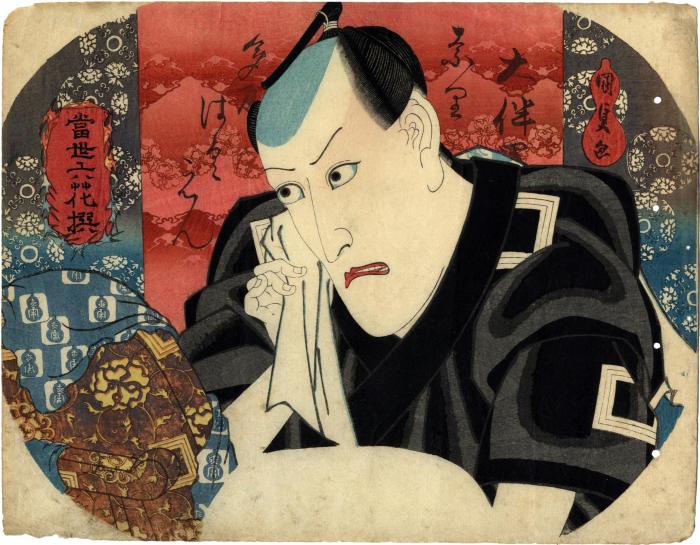Utagawa Kunisada (歌川国貞) / Toyokuni III (三代豊国) (artist 1786 – 01/12/1865)
Ichikawa Danjūrō VII wipes his face in front of a makeup - from the series Tōsei rok'kasen ('Six Choice Modern Flowers' - 當世六花撰)
1834
9 in x 11.5 in (Overall dimensions) Japanese woodblock print
Signed: Kunisada ga (国貞画)
Lyon Collection - Kunisada surimono with yau seal motif "As suggested by the title to the left, six prints make up this set of fan prints, which compares contemporary actors with classic poets, in this case Ichikawa Danjūrō VII with Ōtomo no Kuronushi (dates unknown). the title puns on the homophonic ka (poet) and ka (flower)."
"Seated in front of his makeup mirror, the celebrated Kabuki performer wipes his face with a hand towel. The artist was now in his forties, and Kunisada's problem was how to render the aging star successfully without making him look too old. He did this by elongating his face, while retaining his large jewel-like eyes to subtly suggest his vigor in a complimentary way. Dressed in a black summer robe emblazoned with the actor's mimasu crest he is surrounded by other symbols of his identity: scrolling peony and mimasu crests on his lacquer mirror stand; the mirror itself wrapped in a cloth decorated with his name, Yauan; the brocade patterns in the background formed of peony roundels; and a peony and bat (good fortune) pattern - plus an inscription giving the actor's guild name Naritaya and his poetry name, Hakuen. With so many symbols, Kunisada's subject would have been clear to any viewer."
"The mirror printing (shōmezuri) and careful attention to detail, along with the lack of publishers' and censor seals, suggest that this fan was a private commission, not for public sale, but to be given out as an expensive summer gift."
The quotes above is from Utagawa Kunisada: His World Revisted by Sebastian Izzard, p. 130. 2021, Illustrated in a full-page color reproduction on page 131.
****
Danjūrō's crest, the mimasu or three nested measures of rice, is visible on his robe and in the lacquer work of the mirror he is looking into. Draping the mirror is a blue and white printed cloth with the 'yau seal' in a gourd motif. This is an alternative name for many Ichikawa actors and also the name of the family's residence in Fukugawa. It appears on another print in the Lyon Collection. See the link to the Ebizō VI Danjūrō VII above.
If you click on this print and enlarge it you should look closely at the decorative red background that frames the actor's head. Part of the patterning looks like images of mountains, possibly intended to be Mt. Fuji. On both sides of the top of this 'mountain' are what might pass for clouds, but on closer inspection are stylized bats, a truly propitious symbol. They are definitely bats, but come off as some kind of pre-Freudian Rorshach test. These bats also appear in a repetitive pattern below the base of the mountains.
There is an untranslated poem written across this reddish field. It is most likely one written by the actor himself.
The title cartouche on the left, also in red, is surrounded by birds in flight. The golden colored ones around the upper half of the cartouche are geese, the lower ones in blue are as yet unidentified.
actor prints (yakusha-e - 役者絵) (genre)
Ichikawa Danjūrō VII (七代目市川團十郎: 11/1800 to 2/1832) (actor)
bats (komori - 蝙蝠) (author)
